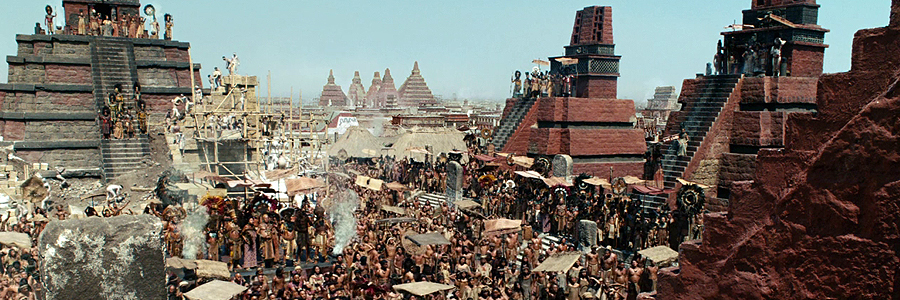
Apocalypto

APOCALYPTO (MOVIE)
Touchstone Pictures
Original release: December 8th, 2006
Running time: 138 minutes
Director: Mel Gibson
Writers: Mel Gibson, Farhad Safinia
Composer: James Horner
Cast: Rudy Youngblood, Raoul Trujillo, Mayra Sérbulo, Dalia Hernández, Ian Uriel, Gerardo Taracena, Rodolfo Palacios, Bernardo Ruiz Juarez, Ammel Rodrigo Mendoza, Ricardo Diaz Mendoza, Israel Contreras
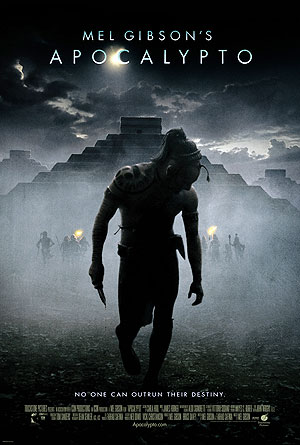
“A great civilisation is not conquered from without until it has destroyed itself from within” ~ W. Durant
Everything has a beginning and an end, whether or not we perceive it. The same can be said for us; our time here is finite and though we often choose to ignore this fact, each day we’re drawn closer to the edge of our existence, both as individuals and as a civilisation. I find myself wondering who’ll tell our story centuries from now, and if there’ll be anyone left to tell it to.
When we look back on past civilisations, and particularly empires such as Persia, Russia, Egypt and Rome, we can’t help but wonder what it must’ve been like before their collapse as we ponder our own demise and ask if there’s still time to prevent it or if we’re really facing the inevitable. Yet there’s another civilisation whose time prior its fall perhaps mirrors our own in ways, even frightening us too much if we gaze too closely at it.
In Mel Gibson’s ambitious and daring film Apocalypto what we witness is more than just a civilisation on the brink of a fall, we get a glimpse at how the Mayans worked, played and related to each other, as well as how they dealt with opposing forces that threatened their survival. We also get a sense of their beliefs and the idea that there might’ve been a spiritual force guiding them along. From its opening scenes it takes us deep into the jungle where we see tribe hunting for meat. Soon after catching the animal and dividing its parts they come across a group of refugees who ask their permission to pass through, explaining that they’ve been attacked. As one tribe gazes into the eyes of the other something’s communicated between them and they, like us, can feel it’s only a matter of time before the same fate befalls them.
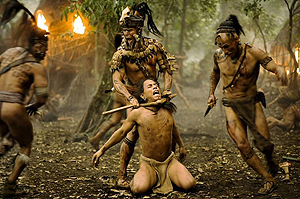
Later that night Jaguar Paw (Rudy Youngblood) has a dream about the leader of the refugees. In the dream he stands before him holding his heart in his hand. There’s a visible wound below his chest and he’s screaming “Run!” as a wild dog barks franticly, warning of the oncoming danger. Jaguar Paw wakes from the nightmare to see a band of warriors entering the camp and it’s from here the carnage begins as they set the huts on fire and anyone they don’t kill they take prisoner. Jaguar Paw quickly gathers his heavily wife Seven (Dalia Hernández) and his little son Turtles Run (Carlos Emilio Báez), leading them to the safety of an underground cave. He lowers them down using a vine and returns to battle where he’s captured and witnesses the murder of his father Flint Sky (Morris Birdyellowhead) at the hands of Zero Wolf (Raoul Trujillo), the leader.
Without Jaguar Paw to help them out of the cave, Seven and Turtles Run are left to fend for themselves. Leaving behind the children, the mothers and fathers are forced to walk while tied to poles as they begin their journey to the Mayan city. Along the way they encounter razed forests, failed crops and villages decimated by plague. One child emerges from the dead and utters a cryptic message to the captors who refuse to let her travel with them:
Fearful of the child, the captors back away, leaving her among the dead. As they reach the city and its temple of death raised to the sky where many of the prisoners will be sacrificed before a cheering crowd we start to understand the story and message of 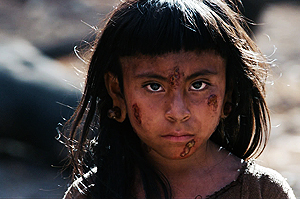 Apocalypto and why it’s relevant to our current civilisation. Like all the others that have come before it, ours is at the tipping point and has been for some time now. With so much for so few and so little else for so many it’s a system we know will eventually fail and when it does everything will fall with it.
Apocalypto and why it’s relevant to our current civilisation. Like all the others that have come before it, ours is at the tipping point and has been for some time now. With so much for so few and so little else for so many it’s a system we know will eventually fail and when it does everything will fall with it.
As Jaguar Paw’s life is spared with the event of an eclipse it buys the him and the rest of the men enough time to plot their escape, but even with his own life is danger it’s Seven and Turtles Run his mind remains on and they’re the ones he’ll do anything to get back to. As a film, Apocalypto is breathtaking and brutal and at times frightening in its depiction of a world that’s both lost and somehow still familiar at the same time. Perhaps what sums it all up best is a story told by one of the elders at a campfire:
As a civilisation that continues to take from everything around it to fill an unfillable void, we’re the ones in that tale the elder tells. And like those who came before us, we too will continue to consume until there’s nothing left. And like the Mayans depicted in Apocalypto there are signs of our fate all around us, if only we could see them before it’s too late.
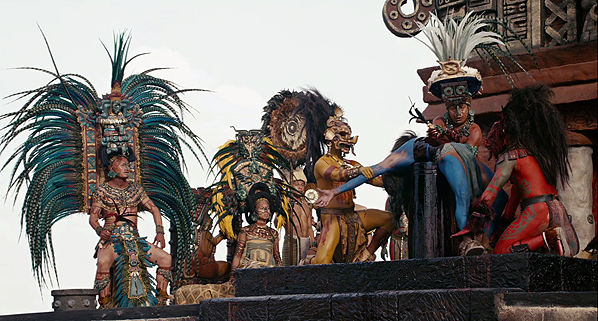

Patrick Samuel
The founder of Static Mass Emporium and one of its Editors in Chief is an emerging artist with a philosophy degree, working primarily with pastels and graphite pencils, but he also enjoys experimenting with water colours, acrylics, glass and oil paints.
Being on the autistic spectrum with Asperger’s Syndrome, he is stimulated by bold, contrasting colours, intricate details, multiple textures, and varying shades of light and dark. Patrick's work extends to sound and video, and when not drawing or painting, he can be found working on projects he shares online with his followers.
Patrick returned to drawing and painting after a prolonged break in December 2016 as part of his daily art therapy, and is now making the transition to being a full-time artist. As a spokesperson for autism awareness, he also gives talks and presentations on the benefits of creative therapy.
Static Mass is where he lives his passion for film and writing about it. A fan of film classics, documentaries and science fiction, Patrick prefers films with an impeccable way of storytelling that reflect on the human condition.
© 2022 STATIC MASS EMPORIUM . All Rights Reserved. Powered by METATEMPUS | creative.timeless.personal. | DISCLAIMER, TERMS & CONDITIONS
HOME | ABOUT | CONTACT | TWITTER | GOOGLE+ | FACEBOOK | TUMBLR | YOUTUBE | RSS FEED
CINEMA REVIEWS | BLU-RAY & DVD | THE EMPORIUM | DOCUMENTARIES | WORLD CINEMA | CULT MOVIES | INDIAN CINEMA | EARLY CINEMA
MOVIE CLASSICS | DECONSTRUCTING CINEMA | SOUNDTRACKS | INTERVIEWS | THE DIRECTOR’S CHAIR | JAPANESE CINEMA





